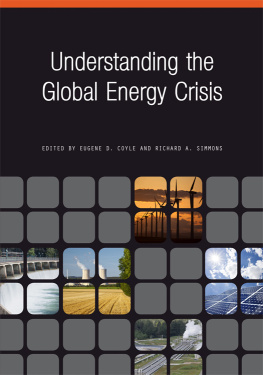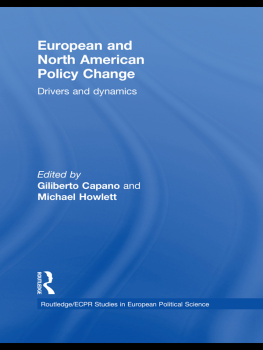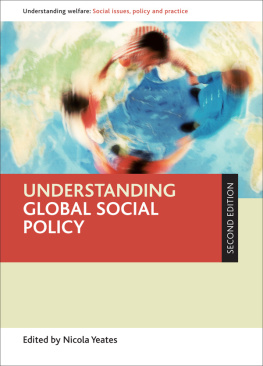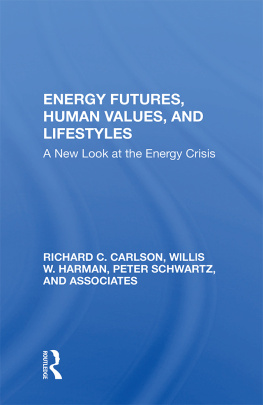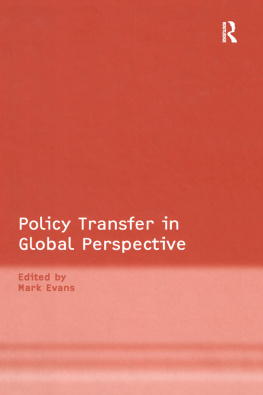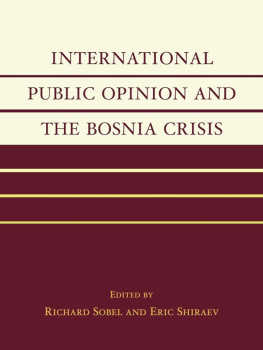Understanding the
Global Energy Crisis
Purdue Studies in Public Policy
Understanding the
Global Energy Crisis
EDITED BY EUGENE D. COYLE AND
RICHARD A. SIMMONS
Published on behalf of the
Global Policy Research Institute
by Purdue University Press
West Lafayette, Indiana
This book is licensed under a Creative Commons CC-BY-NC License. To view a copy of this license, visit http://creativecommons.org/licenses/by-nc/2.0/.
Understanding the global energy crisis / edited by Eugene D. Coyle and Richard A. Simmons.
pages cm. -- (Purdue studies in public policy)
Includes bibliographical references and index.
ISBN 978-1-55753-661-7 (pbk. : alk. paper) -- ISBN 978-1-61249-309-1 (epdf) -- ISBN 978-1-61249-310-7 (epub)
1. Energy consumption. 2. Energy policy. 3. Energy development. 4. Renewable energy sources.
I. Coyle, Eugene D.
HD9502.A2U495 2014
333.79--dc23

An electronic version of this book is freely available, thanks to the support of libraries working with Knowledge Unlatched. KU is a collaborative initiative designed to make high quality books Open Access for the public good. The Open Access ISBN for this book is 978-1-55753-701-0. More information about the initiative and links to the Open Access version can be found at www.knowledgeunlatched.org.
To our wives,
Lucy Dendy Coyle and Michelle Simmons,
for their abiding encouragement and inspiration
Table of Contents
I believe that this book will be regarded as a classic in describing the emerging global energy crises and alternate approaches for addressing them. It will not only serve several purposes in the technology and policy worlds but will also appeal to a broader audience. As the authors intended, it is an excellent technical source book for engineers and technologists. It provides a comprehensive review of the history of energy conversion and use; current and emerging technologies to achieve energy sustainability in a highly stressed planet; and contemporary international efforts to find solutions to the complex issues involved. Accordingly, it is also a must read for all young individuals of social consciousness, who see themselves as inheritors of grand challenge world issues and have a keen desire to contribute to their solution.
The book is organized such that each chapter begins with an abstract of the subject matter and ends with a summary of key points. The language is aimed at a Popular Science level of technical exposition and is relatively jargon-free considering the wide spectrum of technologies presented. Each chapter includes an extensive list of references to assist the reader in finding sources and additional details of the referenced content.
However, the most important aspect of the book, which is relatively unique, is the way the subject matter is organized. Energy sustainability is presented as a complex issue (or a wicked problem) that is interrelated with other complex issues, such as environmental sustainability, economic sustainability, and in the case of biomass-derived fuels, water and soil sustainability. For such problems there exists not a single solution but a multiplicity of solutions, which must then be judged by equally complex interrelationships among technical, social, and economic factors. These in turn vary regionally throughout the world based on different histories, cultures, social norms, etc. The book carefully addresses these complexities for each energy policy topic presented.
The editors have carefully selected expert authors to explain the technical, social, and economic factors for each topic and present alternative approaches to a solution. The book intentionally avoids advocacy and attempts to be an honest broker to the readers so that they can draw their own conclusions based on the relative advantages and disadvantages presented.
I am exceedingly proud that this book originated in Professor Coyles Fulbright Fellowship at Purdue Universitys Global Policy Research Institute. I also applaud the members of the faculty at Purdue and at the Dublin Institute of Technology who contributed to it, exemplifying a successful trans-Atlantic partnership. This product is a glowing example of the vision of the GPRI to engage more faculty and students at Purdue and elsewhere to conduct research and careful analysis of grand challenge global issues to inform the nations policy and decision makers.
Arden L. Bement, Jr.
Biographical Sketch
Arden Bement, Jr. retired from his position as the founding Director of the Global Policy Research Institute at Purdue University in 2013. Prior to that position, he was the Director of the National Science Foundation from 2004 to 2010. He served as a member of the U.S. National Commission for UNESCO and as the vice-chair of the Commissions Natural Sciences and Engineering Committee. He is a member of the U.S. National Academy of Engineering, a fellow of the American Academy of Arts and Sciences, and a fellow of the American Association for the Advancement of Science.
This book brings together experts in energy policy, social science, power systems, solar energy, agronomy, renewable energy technologies, nuclear engineering, transportation, and the built environment from both sides of the Atlantic to explore the future of energy production and consumption from technological, political, and sociological perspectives. The volume is not intended to serve as complete in-depth coverage of all energy sector technologies, nor to cover energy policy comprehensively for all world regions. It is, however, hoped that the topics selected and questions addressed will encourage further engagement and debate among not only students, but anyone with interest in energy sustainability, climate change, and related challenges.
These issues are multi-dimensional and complex in nature; wicked problems with no easy answers. The book explores issues such as financial outlay and tariff support, the readiness of emerging technologies such as wave and tidal energy converters, the degree of wind energy that may be accommodated on national networks, the extent to which solar energy may be deployed, challenges and uncertainties in the production of advanced biofuels, concerns about natural gas extraction via hydraulic fracture (hydrofracking), and whether nuclear energy should become more widely used or taken out of the generation mix.
In many quarters there is a sense of a race against time in trying to undo the current and introduce the new technologies that will help reduce carbon emissions back to within acceptable levels and, in so doing, offset further increases in global average temperature. It is also important to remain focused and seek agreement on practical steps that may be taken in both the short term, through research and innovation for renewable technologies and efficiency in energy use, and longer term through replacement of coal, oil, and gas by commercially viable renewable technologies in much greater proportions than are achievable today.
We the editors are strong proponents of a growing dialogue between the technology and policy communities, and attest to the value of a broader exchange among stakeholders. Through our respective participation in programs such as the Fulbright Scholarship and the AAAS Science and Technology Policy Fellowship, we have witnessed ways in which this dialogue can both inspire and be transformed into action.

 An electronic version of this book is freely available, thanks to the support of libraries working with Knowledge Unlatched. KU is a collaborative initiative designed to make high quality books Open Access for the public good. The Open Access ISBN for this book is 978-1-55753-701-0. More information about the initiative and links to the Open Access version can be found at www.knowledgeunlatched.org.
An electronic version of this book is freely available, thanks to the support of libraries working with Knowledge Unlatched. KU is a collaborative initiative designed to make high quality books Open Access for the public good. The Open Access ISBN for this book is 978-1-55753-701-0. More information about the initiative and links to the Open Access version can be found at www.knowledgeunlatched.org.
